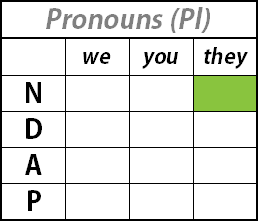

Below is a brief overview of the most important specifics of German grammar from the perspective of an English (native) speaker. If you learn to apply these rules correctly, you will soon be able to speak reasonably good German. That is, most of the German grammar rules are very logical and often related to grammar rules found in many other European languages. But for a language, having precise grammar rules is not all that bad after all.
accusative, dative and genitive prepositions This exercise justĪsks you to choose the appropriate case for each preposition.Many people, including German native-speakers themselves, believe that German is a difficult language to learn because of its complex grammar. pronouns and possessive articles This exercise includes the above mnemonic hints to help you learn these words where there is such a hint, you can click on "Hilfe" to see it. Übungen Ĭlick here to do all these exercises in sequence (use the "weiter" button to get from one to the next), or click on the links below to pick out individual ones. The feminine singular "ihr" looks and sounds roughly like its English counterpart "her." The 3rd person plural form is also "ihr" except in the Dative, the "she" pronouns are always the same as the "they" pronouns For the possessives, note "mein," "dein" and "sein" rhyme. For the "we" forms, note nominative "wir" sounds like English "we," and accusative and dative "uns" sounds like English "us.". The third person singular and plural pronouns roughly rhyme with the corresponding forms of "der/das/die" in the Nominative, Accusative and Dative: er der, ihn den, ihm dem, sie die, sie die, ihr der, es das, es das, ihm dem, and in the 3rd person plural sie die, sie die, ihnen den (sort of). To remember the accusative prepositions, use the acronym "O Fudge", or ask your instructor about chanting "Durch-für-gegen-ohne-um, Deutsch zu lernen ist nicht dumm." For the dative prepositions, sing "Aus-außer-bei-mit, nach-seit, von-zu" to the tune of the "Blue Danube" waltz, or think of the touching love poem "Roses are red, violets are blue, aus-außer-bei-mit, nach-seit, von-zu.". For the Genitive, the -s and -r endings are like the endings of English "his" and "her.". For the Dative, the -m and -r endings are like the endings of English "him" and "her" as in "for him" and "for her.". Once you know the nominative forms of der/das/die, you essentially know the accusative forms, which are the same except for the masculine accusative, where "der" changes to "den.". Note the ein-word endings are the same as the der/das/die endings, except in the masculine and neuter nominative and the neuter accusative, where the ein-words have no ending. (=>meines, deines, seines, ihres, their, unseres, eures + (e)s) (=>meinen, deinen, seinen, ihren, their, unseren, euren + n) (=>meiner, deiner, seiner, ihrer, their, unserer, eurer) (=>meinem, deinem, seinem, ihrem, their, unserem, eurem) (=>meinen, deinen, seinen, ihren, their, unseren, euren)Īus, außer, bei, mit, nach, seit, von, zu (=>meine, deine, seine, ihre, their, unsere, eure) 

(=>mein, dein, sein, ihr, their, unser, euer) Learn the two charts on this page well, and everything else you do in German will become a lot easier for you!ĭer/das/die and Ein-word endings (including endings for the possessive adjectives mein, dein, sein, ihr, unser, euer)

German grammar tables pdf#
Basic Chart of Forms of der/das/die, ein-words, Pronouns Click the link for a PDF of the "Basic Chart" (also including the two-way prepositions) that will print on one page!








 0 kommentar(er)
0 kommentar(er)
